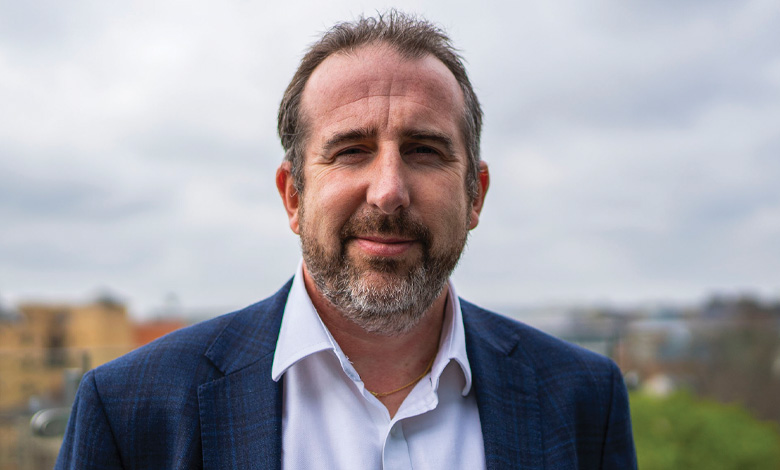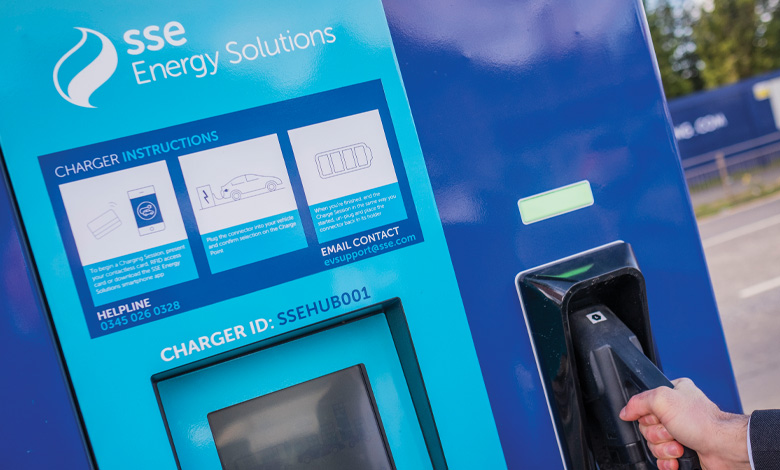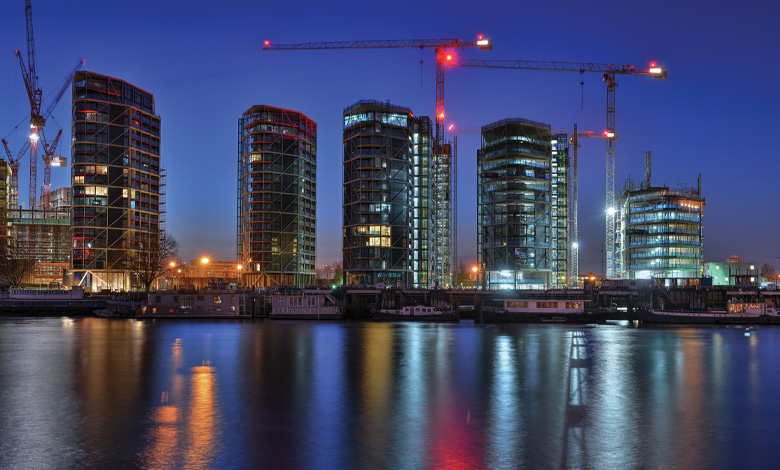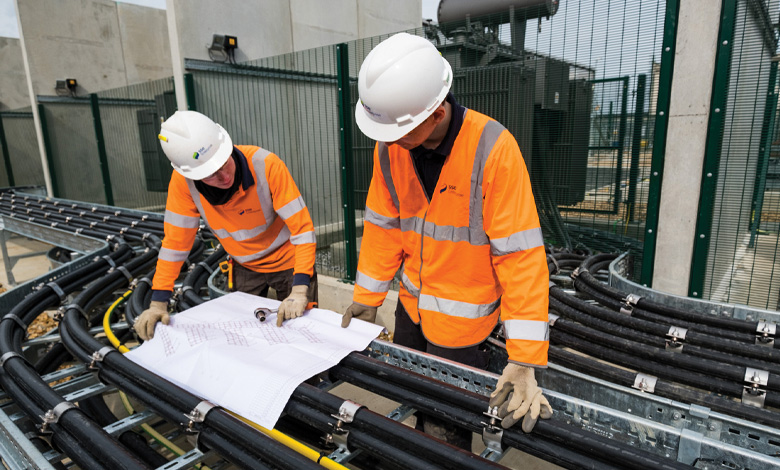Whole-system thinking key to decarbonisation

Nathan Sanders, Managing Director of Distributed Energy at SSE Energy Solutions, discusses how the organisation’s whole system approach can aid Northern Ireland’s decarbonisation journey.
With a planned investment in the UK and Ireland of £18 billion by 2027, representing spend of almost £10 million a day on average in clean energy, to deliver its Net Zero Acceleration Programme to address climate change head on, UK-listed energy infrastructure company SSE is behind some of the most innovative decentralised energy projects across the UK and Ireland.
Sanders believes that Northern Ireland represents a prime location for SSE’s whole systems thinking to help rapidly accelerate the ambition of a decarbonised region.
Positioning SSE Energy Solutions as one of the only providers that take a whole-system thinking approach to decarbonising energy, heat, and transport, delivering solutions for cities and regions, the Managing Director emphasises the organisation’s reach into all aspects of renewable energy ranging from generation to transmission, through to distribution, heat, and transport.

This knowledge has inspired the development of decentralised energy solutions including the likes of EV infrastructure, flexible generation, storage, heat, and electrical networks, which Sanders explains are “integral to the development of local energy systems which harness innovative renewable energy solutions including onsite behind the meter solar and battery, waste to energy technology, as well as clean traceable power from our large onshore and offshore projects”.
Explaining the concept further, he says: “If you try to decarbonise one element of your business, you will not effectively meet your needs to fully decarbonise. Whole-system thinking is the sum of all the individual parts of a journey to net zero for organisations and our clients. Our whole-system approach means we support in investment, build, and control of localised flexible energy assets, looking across energy, heat, and transport use.”

Two major elements of SSE’s decarbonisation approach are a decentralised energy landscape and greater levels of public-private collaboration.
On a future energy system that is transitioning away from a centralised top-down approach to a more local, distributed system, Sanders says: “Our whole-system approach helps communities accelerate their transition to net zero by creating a more resilient and sustainable energy system by investing in, building and connecting localised flexible infrastructure, using technology and data analytics to drive the long-term performance of energy assets.”
“Whole-system thinking is the sum of all the individual parts of a journey to net zero for organisations and our clients.”
On collaboration, the Managing Director envisages a transition in the way public and private sector organisations are working together to tackle the big-ticket climate issues. “Collaboration is key to delivering decarbonisation, ensuring that we are working with large energy users, with end users in the supply chain, and with competitors. We recognise that a siloed mentality will only help deliver one solution. So, for example, delivery of a heat network, without a suitable source of heat take-off, is not joining the system together. Instead, what we need is all partners working collaboratively with the interest of the wider region to explore where decarbonisation can provide a more effective solution.”
The SSE group already has a strong presence in Northern Ireland where its renewables business SSE Renewables owns and operates 117MW of onshore wind capacity across four generation sites. In Ireland, SSE Renewables owns and operates 692MW across 26 operational onshore wind farms including the country’s largest wind farm, the 174MW Galway Wind Park in Conamara, County Galway.
As one of the largest providers of renewable energy in the all-island Single Electricity Market, retail energy supplier SSE Airtricity provides greener electricity, natural gas, and essential services to over 300,000 homes and businesses across Northern Ireland.
Alongside the development of onshore (including wind, solar and battery) and offshore projects by SSE Renewables, a myriad of other solutions are also being delivered by SSE businesses including decarbonised solutions to domestic premises and SMEs, including solar.
Sanders explains that his division of SSE, SSE Energy Solutions, is aiming to bring decentralised energy projects, similar to those already being delivered in Great Britain, to Ireland.
Examples provided by the Managing Director include Royal Woolwich Arsenal in London where “we are retrofitting low carbon heating to our existing heat network, enabling the site’s expansion and helping to save 2,000 tonnes of carbon each year”.
Similarly, for Medway Council, Kent, SSE is partnering to deliver solutions that will see a 20 per cent reduction in carbon emissions and a 35 per cent cost saving across 11 major public buildings.
SSE has also completed the installation of a 3MW solar panel system on the rooftops of Sky Studios Elstree which will supply at least 40 per cent of the site’s annual energy consumption over the year, with early data suggesting it is likely to be even more.
Following the launch of a 10-bay rapid EV charging hub at Gapton Hall Retail Park in Great Yarmouth, SSE is working with M7 Real Estate (M7) to deliver a further 50 charging stations.
Underpinning Sanders’ belief that those decarbonised solutions being deployed in Great Britain can be delivered in Northern Ireland is a plan by SSE Energy Solutions to build at least 30 ultra-rapid charging hubs on the island of Ireland over the next four years, the first of which will be a 10-bay ultra-rapid charging facility at Lough Sheever Corporate Park in Mullingar, Westmeath.

Northern Ireland
Quizzed on the opportunities that exist for Northern Ireland, Sanders says: “When it comes to distributed energy, the opportunity I see for someone like SSE in Northern Ireland is to ‘market make’. In building a backbone of heat, transport, and energy decarbonisation, SSE is willing to do the hard yards and put risk capital at work, where we can identify solutions that will take people on a journey of decarbonisation.
“However, to do so, we have to partner with those key energy stakeholders, to ensure we incorporate that whole-system thinking. We want to showcase our experience and become that trusted partner, working with the commerical, industrial and public sectors to deliver collective solutions together.”
In February 2023, SSE Energy Solutions hosted a round table discussion with agendaNi, which brought together key stakeholders from across Northern Ireland’s energy sector to identify potential partnerships and pathways on the journey towards net zero decarbonisation.
Sanders explains that the vested interest in decarbonising the city of Belfast and the region as a whole, exhibited by all involved, was welcome.
Sanders believes that uptake in the drive to decarbonise in Northern Ireland cannot be attributed to recent energy price hikes alone.
“I think the recognisable drive to decarbonise is more complex than price alone. Undoubtedly, price fluctuations in the past two years have motivated the need for stable prices through indigenous renewable energy.
“However, the majority of users and the commercial world understand there is a need to decarbonise, because consumers are demanding it. There has been a mentality shift among the populace, and as a result, pressure is being applied to commercial outfits to ensure they are taking action to achieve net zero. The need and the want exist, but often the barrier comes when identifying the how, and that is where SSE Energy Solutions can help by being that trusted partner and bringing stakeholders together.”
Sanders points to the publication of a Net-Zero Carbon Roadmap for Belfast and the ambition of Belfast Harbour to be a “truly sustainable, clean, Green Port”, as prime examples of how SSE’s success in other parts of the UK, such as delivery of a green port at the Port of Dover, can see it act as a trusted partner in delivering decarbonisation solutions for Northern Ireland.
“By investing in whole energy solutions for cities and regions, SSE can act as a trusted advisor to local government on their decarbonisation journeys, ensuring vital progress is made towards net zero and delivery of local climate change plans.”
Community
Sanders is quick to point out that the benefits of a decentralised approach to decarbonisation go beyond a reduction of carbon emissions. As part of SSE’s Net Zero Acceleration Programme, which will see an investment of up to £40 billion by 2032 in low carbon technologies, SSE is building career pathways to support the ongoing development of highly skilled jobs, with investment helping to regenerate communities and support reindustrialisation.
“By providing communities the solutions needed to decarbonise heat, energy, and transport, the opportunity also exists to provide greater opportunities to those communities. SSE prides itself on ensuring that through our investments we are increasing the skills within those communities, providing training and employment, while also aiming to improve outcomes in those areas of greatest disadvantage,” he states.
Concluding on the existing barriers to decarbonisation in Northern Ireland, Sanders says that “speed to change” is the greatest factor. “Businesses have knowledge and aspirations of the direction they need to travel, but lack of clear policy and regulation can hinder the speed at which companies get moving. By engaging with us, companies can move at pace, utilising our expertise on their journey to net zero.
“There is a danger that if organisations of any size continue to work too independently in silos, holding things in and not sharing, that we will not deliver net zero. It always impresses me how collaboration unlocks the speed at which we can travel on our journey to net zero. It is clear to me that collaboration will unlock the speed of the journey to net zero. That willingness to share can shape the future,” he concludes.
Profile: Nathan Sanders

Nathan Sanders is the Managing Director of Distributed Energy for SSE Energy Solutions, having worked for SSE for almost 40 years. Having begun his career as an apprentice electrician for Southern Electric, Sanders has held various management positions. Prior to his current role, Sanders was Managing Director of Utilities in SSE’s Enterprise division.

W: www.sseenergysolutions.co.uk





